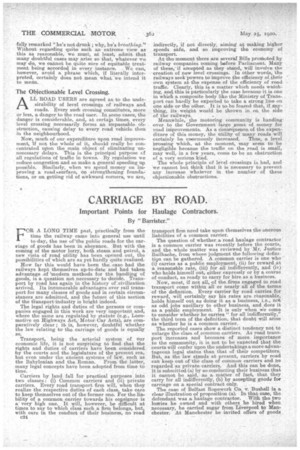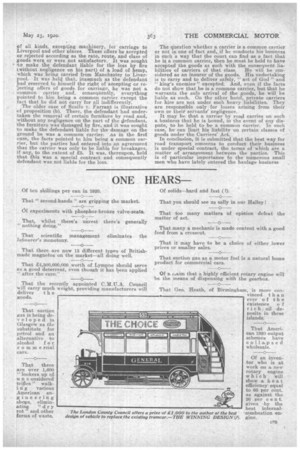CARRIAGE BY ROAD.
Page 2

Page 3

If you've noticed an error in this article please click here to report it so we can fix it.
Important Points for Haulage Contractors. By "Barrister."
FOR A LONG TIME past, practically from the time the railway came into general use until to-day, the use of the public roads for the carriage of goods has been in abeyance. 'But with the coming of the motor lorry, both steam and petrol, a new vista of road utility has been opened out, the possibilities of which are as yet hardly quite realized.
How far this would have been the case had the railways kept themselves up-to-date and had taken advantage of 'modern methods for the handling of goods, is a question not necessary to decide. Transport by road has again in the history of:civilization arrived. Its innumerable advantages over rail transport for many classes of goods and in certain circumstances are admitted, and the future of this section of the fransportindustry is bright indeed.
The legal rights and duties of the persons or companies engaged in this work are very important and, where the same are regulated by statute (e.g., Locomotive on Highways Act, Motor Car Acts), are comparatively clear ; it is, however, doubtful whether the law. relating tothe .carriage of goods is equally
so. .
Transport, being the arterial system of Our economic life, it is not surprising to find that the rights and duties of carriers have been considered by the courts and the legislature of the present era, but even under the ancient systems of law, such as the Babylonian and the Roman. From the latter, many legal concepts have been adopted from time te time.
Carriers by land fall for practical purposesinto two classes : (i) Common carriers and (11) private carriers. Every road transport firm will, when they realize the respective duties of each class, take care to keep themselves out of the former one. For the liability of a common carrier towards his consignor is a" very high one. It will, however, be difficult at times to say to which class such a firm belongs, but, with care in the conduct of their business, no road c24
transport firm need take upon themselves the onerous liabilities of a common carrier.
The question of whether a road haulage contractor is a common carrier was recently before the courts, and the whole matter was reviewed by Mr. Justice Bailhaehe, from whose judgment the following definition can be gathered. A common carrier is one who (1)carries as a public employment, (ii) for reward at a reasonable rate, (iii) for all indifferently, and. (iv) who holds himself out, either expressly or by a course of conduct, as ready to carry for hire as a business.
Now, most, if not all, of the firms engaged in road transport come within all or nearly all of the terms of the definition. Every carrier by road carries for reward, will certainly say his rates are reasonable, holds himself out as doing it as a business, i.e., net as odd jobs ancillary to other busineSs, and does it as a public employment. It is only when vie come to consider whether be carries " for all indifferently," the third. term of the definition, that doubt will arise as whether he is a common carrier.
The reported cases show a distinct tendency not to enlarge the class of common carriers. As road trans port
port increases and becomes of more importance to the community, it is not to be expected that the courts will confer upon the undertakings a more advantageous legal status than that of their competitors. But, as the law stands at present, carriers by road can keep out of the class of common carriers and be regarded as private carriers. And this can be done, it is submitted (a) by so conducting their business that it cannot be said, as a matter of fact, that they carry for all indifferently, (b) by accepting goods for carriage on a special contract only. The caee of Belfast Ropework Co. v., Bushell is a clear illustration of proposition (a), In that case, the defendant was a haulage contractor. With the two buries he owned and with others he hired when necessary, he carried sugar from Liverpool to Manchester. At Manchester he invited offers of goods Qr all kinds, excepting machinery, for carriage to Liverpool and other Places. These offers he accepted or rejected according as the rate, route, and class of goods were or were not satisfactory. It was sought
• to make the defendant liable for the loss by fire (without negligence on his part) of a load of hemp, which was being carried from Manchester to Liverpool. It was held that, inasmuch as the defendant had reserved to himself the right of accepting or rejecting offers of goods for carriage, he was not a common carrier and, consequently, everything pointed to him being a common carrier except the fact that he did not carry for all indifferently.
The older case of Scaife v. Farrant is illustrative of proposition (b). There, the defendant had undertaken the removal of certain furniture by road and, without any negligence on the part of the defendant, the furniture was damaged by fire, and it was sought to make the defendant liable for the damage on the ground he was a common carrier. As in the first case, the facts pointed to him being a common carrier, but the parties had entered into an agreement that the carrier was only to be liable for breakages, if any, to the extent of £5. It was, thereupon, held that this was a special contract and consequently defendant was not liable for the loss. The question 'whether a carrier is a common carrier or not is one of fact and, if he conducts his business in such a way that the court can find as a fact that he is a common carrier, then he must be held to have accepted the goods as such with the consequent lia
bilities of carriers of that class. He will be considered as an insurer of the goods. His undertaking is to carry and to deliver safely, " act of God." and " king's enemies" excepted. And, even if the facts do not show that he is a common carrier, but that he warrants the safe arrival of the goods, he will he liable as such. On the other hand, private carriers for hire are not under such heavy liabilities. They are responsible only -for losses arising from their own or their servants' negligence..
It may be that a carrier by road carries on such a business that he is bound, in the event of any dispute, to be held to be a common carrier. In such case, he can limit his liability on certain classes of goods under the Carriers' Act. In conclusion, it is submitted that the best way for road transport concerns to conduct their business is under special contract, the terms of which are a niatter of arrangement between the parties. This is of particular importance to the numerous small men who have lately entered the haulage business




























